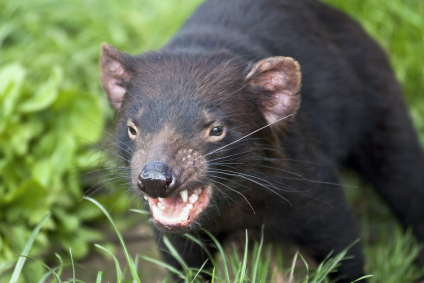 The Devil Facial Tumor Disease (DFTD) is a contagious cancer in Tasmanian Devils that is threatening the species with extinction. This disease is spread from individual to individual and has a 100% mortality rate. It is so deadly because, although the DFTF cells should be attached and killed by the host devil’s immune system, for some reason they are not—and no one is sure why. A study published in PNAS in March of last year (1) showed that DFTD cells don’t express surface MHC molecules. MHC class I and class II molecules are crucial for proper immune response, and their absence on the cell surface could explain why the DFTD cells do not stimulate an immune response.
The Devil Facial Tumor Disease (DFTD) is a contagious cancer in Tasmanian Devils that is threatening the species with extinction. This disease is spread from individual to individual and has a 100% mortality rate. It is so deadly because, although the DFTF cells should be attached and killed by the host devil’s immune system, for some reason they are not—and no one is sure why. A study published in PNAS in March of last year (1) showed that DFTD cells don’t express surface MHC molecules. MHC class I and class II molecules are crucial for proper immune response, and their absence on the cell surface could explain why the DFTD cells do not stimulate an immune response.
The authors found that the loss of MHC expression is maintained as the cells divide, and is not a result of structural mutations in the genes responsible for MHC expression. Instead the authors found that this down regulation was the result of regulatory changes including epigenetic modifications to histones. Continue reading “When DNA Is Not Enough: New Research Suggests Epigenetic Factors Play an Important Role in the High Mortality Rate of the Devi Facial Tumor Disease”
 If you are of a certain age, the name “Tasmanian Devil” most likely conjures up an image of a ferocious brown hairy cartoon character that traveled in the center of a tornado of chaos. Sometimes, as in this case, the truth is much less strange than the fiction. The real Tasmanian Devils (Sarcphilus harrisii) are relatively small, somewhat cuddly looking, marsupials found only on the island of… you guessed it, Tasmania. Despite their diminutive size, they are the largest living carnivorous marsupial. Unfortunately, these terrier-sized animals are also in danger of becoming extinct, largely as a result of a deadly, infectious transmissible cancer called Devil Facial Tumor Disease (DFTD).
If you are of a certain age, the name “Tasmanian Devil” most likely conjures up an image of a ferocious brown hairy cartoon character that traveled in the center of a tornado of chaos. Sometimes, as in this case, the truth is much less strange than the fiction. The real Tasmanian Devils (Sarcphilus harrisii) are relatively small, somewhat cuddly looking, marsupials found only on the island of… you guessed it, Tasmania. Despite their diminutive size, they are the largest living carnivorous marsupial. Unfortunately, these terrier-sized animals are also in danger of becoming extinct, largely as a result of a deadly, infectious transmissible cancer called Devil Facial Tumor Disease (DFTD). 